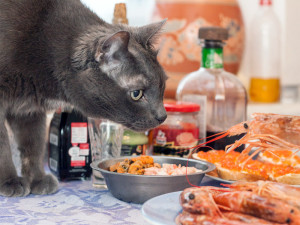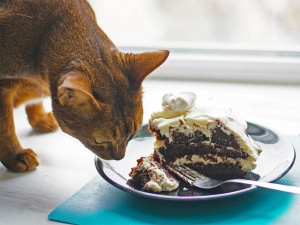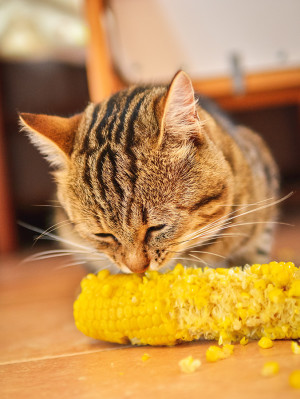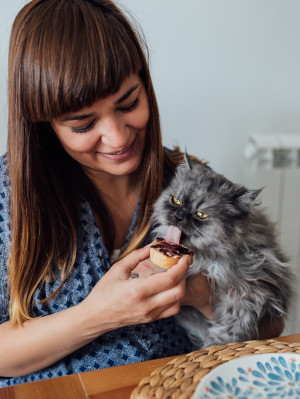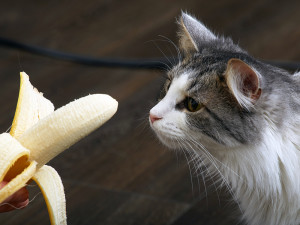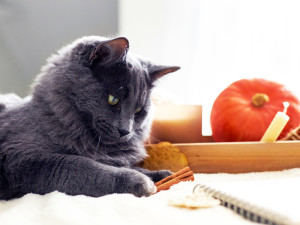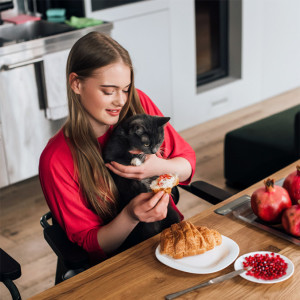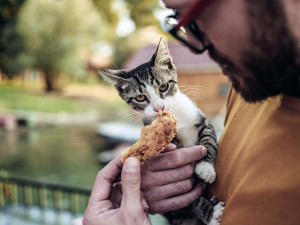Can Cats Eat Yogurt?
A small amount is fine—but keep a close eye on the ingredients list.
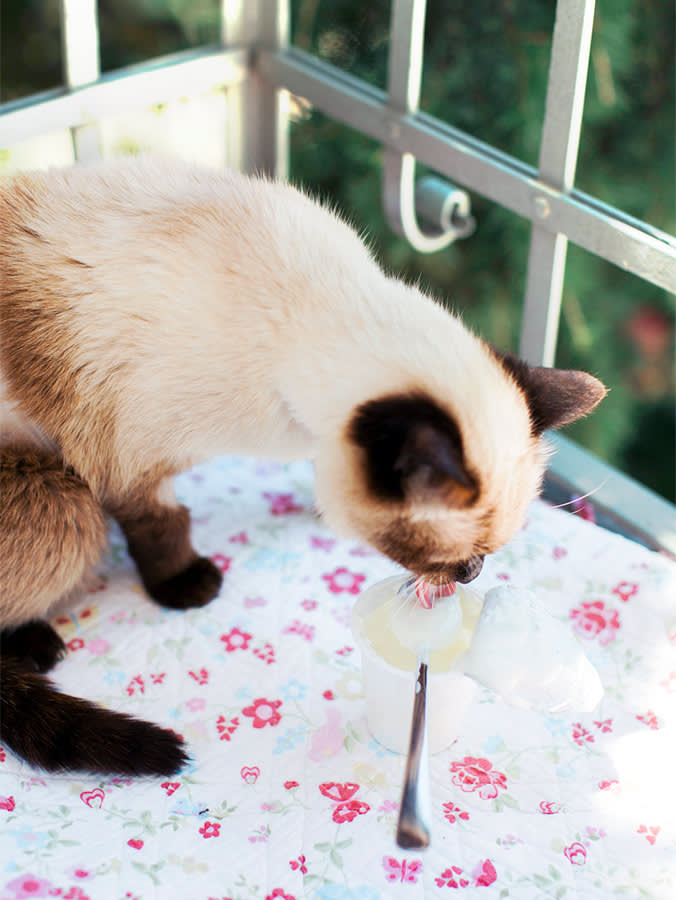
share article

Your pet wants you to read our newsletter. (Then give them a treat.)
Yogurt is having a heyday lately as one of many foods containing probiotics, or the beneficial bacteria that can populate the gutopens in a new tab and have profound effects on digestion, mood, weight, and more. This may have you wondering if your cat can partake in your daily yogurt fest and reap the benefits of yogurt too.
The short answer is that yes, in moderation, a small amount of yogurt is safe for most cats. However, there are a few important caveats to keep in mind. Read on to learn more about sharing yogurt with your cat.
Nutrition facts about yogurt for cats
Most yogurt that we buy commercially is a product of fermenting milk with bacteria — sounds delicious, right? When milk is combined with specific kinds of bacteria under the proper conditions, the bacteria break down lactose, the sugar found in milk, and turn it into an acid which helps to thicken the milk, preserve it, and give it a tart flavor. As a result, dairy-based yogurts tend to contain lots of fat and protein from their milk base. The bacteria used to make yogurt are also potentially the kinds of helpful bacteria known as probiotics; these support the microbiome within the digestive tract.
Yogurt also contains important vitamins and minerals including calcium, potassium, and B vitamins. In some cases, yogurt is made from non-dairy sources such as cashew milk, almond milk, rice milk, or soy milk. The nutritional profile of these yogurts will vary depending on the ingredients, but may contain smaller amounts of protein and/or fat. Not every product sold as yogurt is fermented with bacteria either, so be sure to check the label before buying.
The most common live active bacterial cultures in yogurt are Streptococcus thermophilus and Lactobacillus acidophilus. Some will also contain Bifidobacterium bifidum. While these bacteria can have beneficial effects on the gut, there are a lot of variables that influence their effects. First, the bacteria need to survive the process of production and preservation of the yogurt. Then, they need to make it through digestion, including a dip in stomach acid, to make it to the intestines. This means that consuming small amounts of commercially prepared yogurt may not have such a significant effect on the gut, but it probably doesn’t hurt, either.
Is yogurt good for cats?
In small amounts, yogurt can provide some valuable health benefits to cats and they often like the taste. Some health perks of eating yogurt include:
Fat: Depending on the type of yogurt, fat content will vary, with whole milk sources being highest in fat. Fat is an important nutrient for cats as it provides long-lasting energy. While high-fat dairy products often contain more saturated fat, as opposed to unsaturated fats, which are often considered healthier, this is not a concern for pets since they don’t typically get the same kinds of heart disease as humans.
Protein: Yogurt can be a high-protein snack. Protein is a critical nutrient for cats as it provides amino acids for building important cellular structures in the body and also acts as an energy source. As carnivores, cats have a high protein requirement and all cat foods must be formulated to meet their minimum protein needs.
Probiotics: Most yogurt is a source of probiotics, or the beneficial bacteria that populate the gut and impact health in many fascinating ways. This is a very hot topic in research currently and it seems we learn more and more about the impact of these bacteria on health everyday.
There is evidence that both animals and people need to ingest a very large amount of these bacteria in order for them to have a major effect. A small occasional snack of yogurt is unlikely to provide that. Also, some bacteria are destroyed in the production and preservation of commercially sold yogurt products. If you believe your cat would benefit from probiotics, especially to treat certain health conditions, speak with your veterinarian about cat safe probiotic supplements that may be more effective for this purpose.Vitamins and minerals: Yogurt contains lots of important vitamins and minerals, though these also vary based on the type of yogurt and whether they use a dairy or non-dairy base. Some of the most common minerals in yogurt include calcium, potassium, and iron, along with vitamin D and B vitamins, which are very important for healthy bones, strong teeth, normal muscle contraction, blood clotting, red blood cell function, and heart health.
Can cats eat any kind of yogurt?
The truth is that it depends. There are so many yogurt products available these days, so it is important to review the ingredient label before sharing with your cat. Plain yogurts are going to be the best bet as far as being healthier and less likely to contain any toxic or unhealthy ingredients. For dairy-based yogurts, be sure the product is fermented with live active bacterial cultures as this reduces the amount of lactose in the final yogurt product.
Cats are typically lactose-intolerant, so eating large amounts of dairy can cause digestive upset including vomitingopens in a new tab, diarrhea, and gas. When yogurt is properly fermented, the bacteria break down most of the lactose so most cats can tolerate it as long as they only eat a small amount.
For non-dairy yogurts, also be sure to double check the ingredients and make sure they are all safe for cats. Yogurts made from soy, cashew, coconut, or almond are typically non-toxic as long as they don’t contain added ingredients that are unsafeopens in a new tab.
Is yogurt completely safe for cats?
Plain yogurt is safe for cats in small amounts. There are a few important points to keep in mind when sharing yogurt with your cat:
Beware of sugar and other added ingredients: Many yogurts contain a lot of added sugar, especially if they are flavored. Being obligate carnivores, cats do not metabolize sugar as well as we do, and they are more likely to develop conditions like obesity or diabetesopens in a new tab from a high sugar intake. Additionally other added seasoning or flavoring may be toxic to cats to be sure to double-check the ingredient list before sharing. In general, selecting a plain, low-fat yogurt to share with your cat is the best option.
Dairy content: Cats are considered to be lactose-intolerant and cannot digest dairy products very well. This leads to bloating, gas, and diarrhea if they eat a lot of dairy. Yogurt that is fermented by bacteria usually contains much lower levels of lactose so most cats can tolerate it in small amounts. Just be sure to select a fermented yogurt product with live active cultures, and watch for signs of digestive upset.
High fat: Most cats tolerate fat very well but for some, a sudden high fat snack can cause digestive upset, especially if they are not accustomed to it. Even if your cat tolerates it just fine, keep in mind that high fat snacks add lots of calories to the diet. For cats who are sedentary most of the day, this can easily add up to unhealthy weight gainopens in a new tab and related health problems like diabetes and/or arthritis. Be sure to keep these kinds of high-fat snacks to a minimum.
The bottom line: Can cats eat human food?
Cats are unique in that they are obligate carnivores, and they have very specific nutritional requirements. Unlike humans, they do not metabolize carbohydrates and sugars very well, meaning they should only eat small amounts of these foods. Since their nutritional needs are so specific, it is especially important that they eat a complete and balanced cat food diet to avoid any serious nutritional deficiencies that can cause illness and/or life-threatening complications.
All treats and table foods should be kept to a minimum opens in a new tabso that the bulk of their diet is focused on cat food. This means treats and table snacks should be less than ten percent of a cat’s total intake. Additionally, since indoor cats tend to be more inactive and often need enrichment, try to use treats and even their primary cat food to create enrichment activities.
This can be as simple as hiding treats or dry food around the house so they have to search for it, or something more intricate like puzzle toys opens in a new taband feeders. The goal is to find fun and novel ways to get your cat moving, thinking, and using their hunting skills even if they are just stalking some kibble.
Other foods that are safe for cats
Shrimp can be a high-protein snackopens in a new tab for cats.
Berries like blueberries are lower in sugaropens in a new tab than other fruits and can be OK in moderation.
Sweet potatoesopens in a new tab are also OK in small amounts.
Other foods that are dangerous
Grapes are considered toxicopens in a new tab and should be avoided.
Garlic and onions opens in a new tabare also toxic for cats.
Chocolateopens in a new tab is also a no-no for cats as it is toxic.
FAQs (People also ask)
How much yogurt can a cat eat?
Cats can eat small amounts of low fat plain yogurt and it should never be more than ten percent of their total daily calories.
Is it OK to give cats yogurt?
Plain, low-fat yogurt is OK for cats but beware of yogurts that are high in sugar or contain other possibly toxic ingredients.
Why do cats like yogurt?
As carnivores, cats are often attracted to the flavor of high fat and high-protein foods like yogurt.
Can cats eat non-dairy yogurt?
Yes, cats can eat some forms of non-dairy yogurt as long as all the ingredients are safe for cats. Non-dairy yogurt is often lower in fat and protein, however.
Is yogurt good for cats?
A small amount of yogurt is fine for cats but is not going to provide the nutrients they need most.
Is yogurt safe for cats?
Plain, low-fat yogurt is safe for cats in moderation.
References:

Dr. Amy Fox, DVM
Amy Fox, DVM is a small animal veterinarian in New York City. A lifelong animal lover, Dr. Fox studied biology in college and then worked as a veterinary nurse before pursuing veterinary school at Cornell University. She has worked in many different settings including shelter medicine, emergency medicine, general practice, and animal cruelty and forensics. She is especially interested in nutrition, preventative medicine and care for senior pets. Dr. Fox also enjoys writing about veterinary medicine and teaching. In her free time she loves to cook, garden, and go for long runs.
Related articles
![A cute gray cat lies next to candles and cinnamon sticks on a beige bedspread.]() opens in a new tab
opens in a new tabCan Cats Eat Cinnamon?
You love the spice in your mulled wine and cider. Learn if your cat can enjoy it.
- opens in a new tab
Can Cats Eat Shrimp?
They definitely want to...
![a woman eats breakfast with pomegranate while her cat sits on her lap]() opens in a new tab
opens in a new tabCan Cats Eat Pomegranates?
Vets want them to steer clear. Here’s why.
- opens in a new tab
Can Dogs Eat Tomatoes?
Bite-size pieces of ripe, red tomatoes are safe — but you should skip on the marinara sauce.
- opens in a new tab
Can Cats Eat Sweet Potatoes?
Yep—but the plainer, the better. Here’s why.
![Man feeding small white and gray cat a chicken wing.]() opens in a new tab
opens in a new tabCan Cats Eat Raw Chicken?
Careful — cooked chicken is way safer for your kitty.
